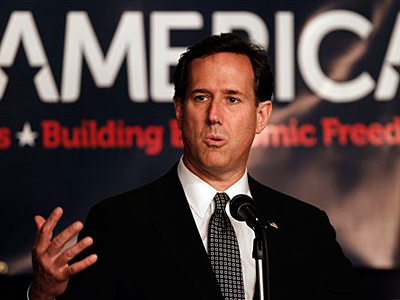2012 Super Tuesday–

Former GOP front-runner Herman Cain
With the 2012 primary calendar moving inexorably toward ‘Super Tuesday,’ this is as good a time as any to indulge a quick review of past fatuities this election cycle.

Michele Bachmann
It’s anything for a joke with some people.
The following is a short list, nowhere near exhaustive, reflecting fleeting moments in time over the months leading to where we are today in the GOP primary season, 2012.
What these funny historical statements all have in common is that they issued from highly qualified or at least well-regarded media outlets and, however intrinsically ridiculous, were taken seriously at the time by equally established and respectable audiences.

Former vice-presidential candidate Sarah Palin
From the Christian Science Monitor:
“When all is said and done, the race for the 2012 GOP nomination may boil down to just three serious contenders: former Governor Romney of Massachusetts, former Governor Pawlenty of Minnesota, and Gov. Haley Barbour of Mississippi.”
“Following the withdrawal of former Minnesota Governor Tim Pawlenty, the field narrows a bit while at the same time expanding to accommodate Texas Governor Rick Perry.
The new top tier roughly consists of Mitt Romney, Michele Bachmann and Rick Perry.”
The Daily Beast:
“The Republican nomination race has suddenly metamorphosed from a snooze fest into a three-way smack down with a fascinating cast of characters. Michele Bachmann and Rick Perry, two aggressive, charismatic religious conservatives, will spend the next few months vying for values voters and the role of chief alternative to Mitt Romney.”
The Alaska Dispatch newspaper:
“Imagine former Massachusetts Gov. Mitt Romney, comfortably campaigning in next-door New Hampshire, keeping the home fires warm as he heads toward an anticipated win in the first primary early in 2012. Then the pugnacious governor of Texas, Rick Perry, jumps in and threatens to take it all away.
Could Governor Perry actually succeed?”
The New York Times:
“With a strong finish in the caucuses, Mr. Perry could re-emerge as a top-tier candidate — perhaps the best-equipped to compete with Mitt Romney, the presumed frontrunner, on a state-by-state basis.”
The New York Post:
“Like a Hurri-Cain, Herman Cain’s presidential campaign has been gathering strength and rocking his opponents–while causing political pros to scrap some of their early forecasts for the GOP field.
Fueled by strong debate performances and his trademark quips, Cain has jumped to the top tier in several independent national polls, including pulling up to a dead heat with Mitt Romney in the latest CBS poll, tied at 17 percent, with Rick Perry trailing at 12 percent.”
The Washington Post:
“1. Cain is already top-tier: Cain has surged to 27 percent in a hypothetical national primary ballot test — up from just 5 percent in an August NBC-WSJ poll. His current standing puts him on par with Romney (23 percent) and makes clear that the two men comprise the top tier in the race as of today. That Cain’s rise has been fueled almost entirely by the struggles of Texas Gov. Rick Perry (Cain went up 22 points between August and October, Perry dropped by 22 points over that same period) is a dynamic that suggests Cain is now the conservatives’ choice in the contest.”
It may be added that none of these opinions were formed in a vacuum. Not even the goofiest ones were idiosyncratic. The above are not one man’s opinion—each expresses the view or hypothesis held at some point by numerous persons, all experienced in their field.
There’s more than one way to go with this. An old saying has it that the worst insult you can level at someone is to accuse him of having no sense of humor. (Can’t say that about the experts quoted above.) I don’t think so. It looks to me as though many people are far more insulted by any criticism, even implied through disagreement, of their judgment of people. This insecurity is often most vehement, vented with most rage, among people who really are not good judges of character, who have shown zero ability to size up a man by his character.
The favorable treatment given by seniors at the Washington Post to GWBush and Dick Cheney as candidates, back in the 2000 election cycle, may be the premier example. Cheney was widely characterized as having ‘gravitas.’ Bush was linked to down-home folksiness rather than to his Wall Street policies. The characterizations masked a breathtaking obtuseness about what Bush and Cheney actually had in mind for the country—assaulting the Middle East abroad and the middle class at home. (Admittedly, the WP had a motive for obtuseness: Bush’s education policy—standardized testing–benefited the Post Co.’s Kaplan Learning sector by billions, a windfall the Post newspaper did not report.)
But the same blinders have been on during the past year, with regard to candidates or potential candidates from Michele Bachmann to Donald Trump. The same people who took George W. Bush seriously as a candidate for the White House were eager to treat Rick Perry the same way, and with the same breathtaking presumption that Texans or Southerners would go for Perry whole hog. They made the same error with regard to Sarah Palin and Women in 2008, and Michele Bachmann and Women in 2011. Regardless of how ridiculous the candidacy, or the potential candidacy, may be, some pundit is always ready to take it seriously—if the person is a Republican. Nor, of course, are the analysts ever held to account for their past mistakes. Who’s keeping score? On television, no one.
The biggest problem may be the way the horse race is so separated, often, from any reasoned discussion of the (disastrous) policies supported by the candidates.
But reporting on policy with the same focus and attention as personalities would destroy the media pretense that the two major parties are somehow equivalent.
There is a continuing dynamic in the GOP contest, 2012, and here it is: It is an ongoing tension between Republican voters who don’t know much about their candidates, and the possibility that they might actually learn about them. The bottom line is that many or most GOP voters in 2012 do not want to know their candidates well. It’s not just that they want to be surprised by a white knight; it’s that they don’t want any information that would shake their willingness to vote along previous party lines or to vote against the president.
So you start with that firm, solid, bedrock fundamental of Tea Partyers and other prospective GOP voters 1) not knowing, AND 2) not wanting to know. This dual fundamental alone goes a long way to explain the brief prominence in the Republican field of Tim Pawlenty, Michele Bachmann, Rick Perry, and Herman Cain. In fact, it is virtually the only thing that does explain the aforementioned prominence.
The same fundamental goes a long way to explain the ongoing longing for some other prominent Republican to enter the race—Sarah Palin, Haley Barbour, Donald Trump, Jeb Bush, Mitch Daniels, Chris Christie, etc. However unrealistic the demand, and however ineligible a prominent GOPer might be—Palin was a disaster on the ticket in 2008, Daniels was GWBush’s budget director, Christie conducted federal prosecutions timed with political advantage, Bush is still a Bush—there is always some cadre of analysts and unnamed insiders ready to take him/her seriously. As long as they don’t know much about the candidate, s/he is in like flint.

Gingrich
It will be mildly interesting to see how this tension plays out over ‘Super Tuesday’ on March 6. At this moment, prognosticators are largely engaged in a cynical guessing game with regard to Newt Gingrich. Will Gingrich’s race-baiting, aided by Romney’s Mormonism and Santorum’s Catholicism, be enough to put Gingrich over the top in the Georgia and Tennessee primaries? Will any of the known anecdotes be enough to shake loose voters from their chosen candidates? Or conversely will any surface gracelessly enough to undermine the attacker rather than the target? This new version of Southern strategy would of course be more viable if Gingrich had succeeded in getting on the ballot in Virginia—where polls showed him leading. (As a result of Virginia’s ballot requirements, only Romney and Ron Paul are on the ballot in the Commonwealth.) More chances for Gingrich on March 13, in Alabama and Mississippi, and another in Louisiana on March 24.
Maybe. They don’t put it as bluntly as I just did, but that’s the game plan.
Meanwhile, more respectably, Ron Paul’s forces are working the caucus states including Idaho, North Dakota, Kansas and Wyoming. As of now little attention looks to be directed any of those places. Iowa is usually the only caucus location that gets big media play. The other primaries and caucuses mainly come down to a question of who will win the most delegates, and an increasingly glum and shriveled media force is increasingly ceding most of them to Romney.








